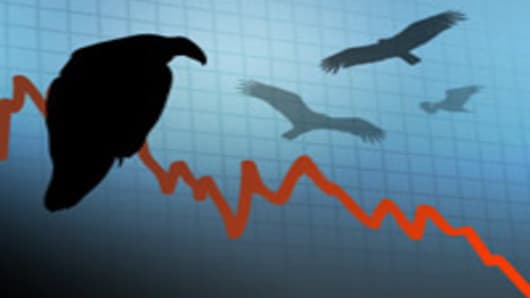There are ten key factors facing the economic recovery which investors need to be cautious of, Jim O'Neill, head of global economic research at Goldman Sachs, wrote in a research note Sunday.
O'Neill's first factor is the fiscal issues facing the euro zone and the battering that many of its debt-laden countries are getting in the bond market.
"Those of us that have been arguing that the issue is containable … are starting to struggle as the price action remains pretty unforgiving, especially now towards Spain, and even France," he said.
The euro zone's fiscal and debt situations aren't as bad on an average basis compared to other counties such as the U.S. and Japan, according to O'Neill.
"Japan’s is much worse. Many think that the (European Monetary Union's) fiscal position is just a 'warm up' act for the real stuff coming up," he said.
Meanwhile, as countries race to slash their spending in a bid to reign in deficits, O'Neill warns that a lack of supply-side reforms, which reduce barriers to production, could end in deflation.
"Cutting deficits for the sake of it, without involving supply-side steps to boost growth (is) not a good idea, especially where demand is weak," he said.
"The absence of significant supply-side reforms in large parts of the developed world mean weak trend growth and deflationary pressures persist," he added.
O'Neill is also concerned about the euro. It's one thing for the euro to cyclically decline, but another when it's because the euro zone itself that is under doubt, he said.
Next is U.S. unemployment and O'Neill points out that there are major drags on President Obama's plan to double exports in five years. The strengthening dollar and European debt problems could prove a negative for jobs growth, according to O'Neill.
The fifth bearish factor is the imminent slowing of the Chinese economy, O'Neill said.
"China is probably in the process of slowing somewhat, which given the degree to which it has warmed up, is good. But this market might not like it for a while," he said.
O'Neill sixth factor is the outlook for Middle Eastern politics.
Next is growing financial stress as measured by Goldman Sach's own Financial Stress Index (FSI). O'Neill points out that even though stress levels are worsening, they have a long way to go if they are to match the Autumn of 2008.
Number eight is Goldman's Global Leading Indicator index (GLI), which is currently negative. When coupled with bearish readings on the Financial Stress Index and the Financial Conditions Index it paints a bleak picture, according to O'Neill.
Next is the G20 which is intent on tightening fiscal policy and ramping up financial regulation despite the concerns over growth in Europe, O'Neill said.
The tenth factor is the technical action on stock charts, O'Neill wrote, pointing out that the S&P 500 has repeatedly failed to get back above its 200-day moving average.
"If a poor technical picture coincides with key signs like the FSI, various FCIs and our GLI losing momentum, then we have to take note," he said.
O'Neill added that without the growth of Brazil, Russia, India and China, the world would have much more to worry about.


